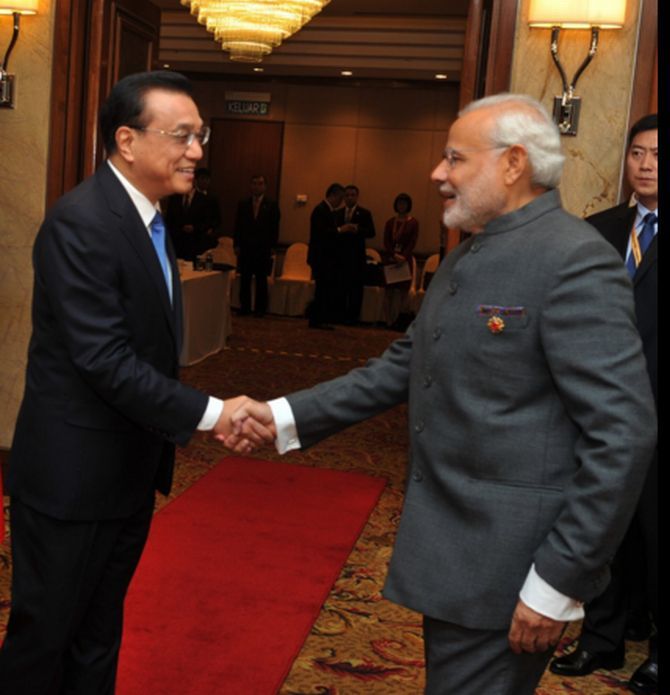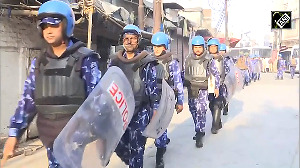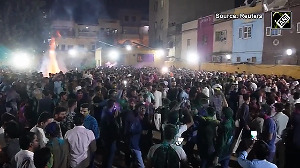
In a major boost to bilateral security cooperation, China and India on Saturday agreed to actively exchange intelligence on terror groups and their activities through a dedicated communication channel.
A comprehensive joint statement issued after talks between Home Minister Rajnath Singh and top Chinese leaders. The security officials said, "Both sides agreed to enhance cooperation in combating international terrorism through exchanging information on terrorist activities, terrorist groups and their linkages."
China and India also agreed to 'coordinate positions on anti-terrorism endeavours at regional and multilateral levels and supporting each other' and promote 'exchanges by groups of counter-terrorism experts to discuss counter-terrorism cooperation,' the statement said.
Indian officials said that such cooperation would provide a major boost to the security ties between the two countries to share intelligence and analyse operations on regional and international terror groups and it would be of great value.
Besides cross border terror networks, which in India's and China’s case are operated through Pakistan and Afghanistan, such cooperation would be of great value to India, especially in cracking down on various militant groups in the northeastern states, officials said.
The terror groups thrived with patronage of China and Myanmar in the past.
While Singh and the Indian officials were tightlipped about the fallout of close anti-terror cooperation on militant networks of North East groups, sources said the new deepening of Sino-Indian security cooperation will have significant positive impact on the challenges India is facing due to terrorism.
The joint statement also referred to the formation of the new security mechanism headed by the two home ministers who will meet every two years to review security issues between the two countries and the formation of an official committee headed by a joint secretary and director general-level official to conduct an annual review.
‘This mechanism will be held once a year, alternately in Beijing and New Delhi. The Ministry of Public Security of China will send a director general-level delegation to India and hold the first director general-level annual meeting in 2016,’ the statement said.
Significantly, the release of the joint statement coincided with the meeting between Prime Minister Narendra Modi and his Chinese counterpart Li Keqiang in Kuala Lumpur on the sidelines of the Association of Southeast Asian Nations Summit.
Modi thanked Li for a very fruitful outcome of Singh's talks here with Chinese officials in the last three days.
Li reportedly delayed his visit to Kuala Lumpur on Thursday to meet Singh.
During the meeting with Singh, Li emphasised on security cooperation between the two countries specially to put up a united fight against terrorism.
After his talks with his counterpart Guo Shengkun and China's security czar Meng Jianzhu, Singh today left for Shanghai where he would visit a local police station and the city's Public Security Command Control to get a glimpse of how China’s biggest metropolis with over 21 million population deals with law and order issues.
Besides terrorism, the two sides agreed to enhance cooperation in exchanging experiences on anti-hijacking, hostage situations and other terrorism related crimes.
'The two sides shall strengthen the cooperation in the fields of combating terrorism, drug-related crimes, cyber crimes including telecom fraud, economic crimes, illegal immigration activities, illegal trafficking in firearms and ammunition and other transnational crimes and encourage the long-term, healthy and stable development of law enforcement cooperation between them,' it said.
'Therefore, the two sides may exchange visits by groups of experts in relevant fields. The two sides shall strengthen the exchanges and cooperation in the area of law enforcement capacity building,' it added.
China and India will support and encourage participation in the training courses and seminars held by each side for the officers from both sides.
'They can learn from each other and exchange the experiences on preventing and combating crimes and coping with non-traditional threats such as terrorism to strengthen their respective law enforcement capacity,' the statement said.
It referred to the consensus achieved in improving relations during the visits of Chinese President Xi Jinping to India last year and Modi's visit here this year.
The consensus 'provides the direction for the development of bilateral relations and created a favourable opportunity for the growth of India-China law enforcement cooperation,' the joint statement said.
Image: Prime Minister Narendra Modi meets Chinese Premier Li Kequiang in Kuala Lumpur on Saturday. Photograph: @narendramodi/Twitter









 © 2025
© 2025